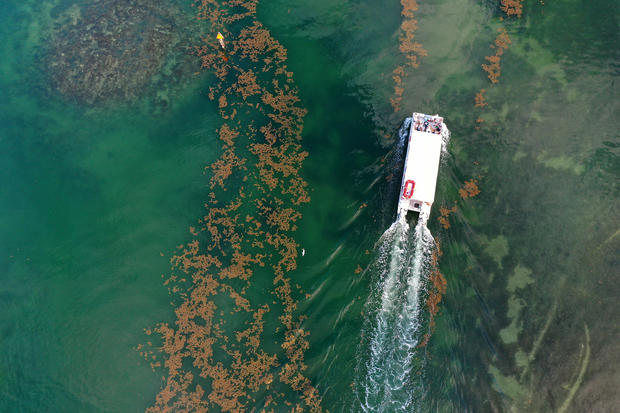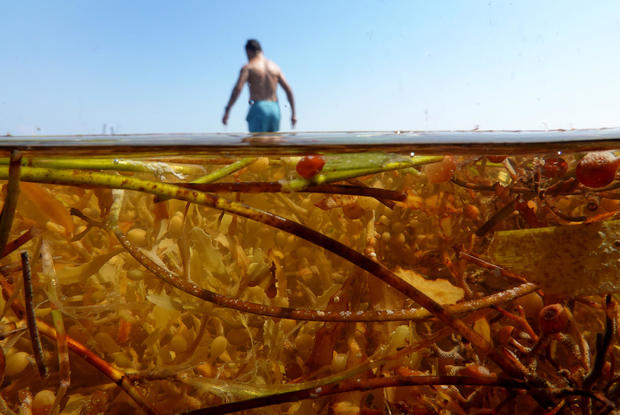Seaweed blob headed to Florida that smells like rotten eggs shrinks "beyond expectation"
Florida's monthslong hit from a giant blob of seaweed that smells like rotten eggs may be over sooner than what was previously thought. Researchers have found that the massive clumps of sargassum that have been washing up on beaches in the state and other areas for months has suddenly shrunk "beyond expectation."
The seaweed clumps were first seen washing up on Florida's East Coast from the Atlantic Ocean in May, making shorelines "undesirable" and making it "difficult to get into the water." That was hitting as the mass, known as the Great Atlantic Sargassum Belt, was making its way toward the state's Gulf Coast with an estimated 13.5 million metric tons of the brown algae.
Once it's onshore and starts to rot, the Florida Department of Health warns, it releases hydrogen sulfide, creating a "very unpleasant odor, like rotten eggs." And while the seaweed itself doesn't cause any kind of harm to humans, it's home to tiny creatures that can irritate skin — and the hydrogen sulfide packs the ability to trigger eye, nose and throat irritaton, as well as potentially causes those with asthma or other breathing issues to have trouble breathing.

But researchers from the University of South Florida said on June 30 that the Great Atlantic Sargassum Belt – which is so large it extends from West Africa to the Gulf of Mexico – has decreased since May, "with a total weight of about 9 million metric tons."
But it's the decreasing amount of sargassum in the Gulf that has stunned researchers the most.
"Although last month we predicted a decrease in the Gulf of Mexico in June, the magnitude of the decrease (75%) was beyond expectation," researchers said, adding that by the end of June, there was "very little" of the seaweed found in the Straits of Florida and along the state's East Coast.
The seaweed also decreased in the Caribbean Sea, reaching "minimal" amounts in its western areas, researchers said, while it increased in the Central West Atlantic.

Recent data has researchers predicting that the blob will continue to be "minimal" in the Gulf through September, and will only have a "moderate" amount of sargassum in the Caribbean Sea through August before decreasing further.
"This trend may continue in the next 2-3 months, which should be good news to the residents living in the Florida Keys and east of Florida as well as the west coast of the Caribbean Sea," researchers said. "Nevertheless, impacts of Sargassum beaching events will continue to be felt throughout some of the eastern Caribbean Sea and possibly western Caribbean sea regions, although it is difficult to predict exact timing and location for individual beaching events."
Researchers said they will continue to monitor the moving blob.
- In:
- Oceans
- Gulf of Mexico
- Florida
- Atlantic Ocean

Li Cohen is a social media producer and trending content writer for CBS News.
Disclaimer: The copyright of this article belongs to the original author. Reposting this article is solely for the purpose of information dissemination and does not constitute any investment advice. If there is any infringement, please contact us immediately. We will make corrections or deletions as necessary. Thank you.







